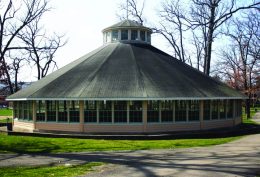
How often do you explore the city of Binghamton?
While time and workload might be large influences on the answer to this question, few may be able to say they do even once a week. However, I am not thinking of Downtown Binghamton, I am thinking of the greater Binghamton area.
Have you ever walked the Rail Trail in Vestal? Have you gone to the farmers market on Upper Front Street? Have you visited Ross Park? Volunteered in Endicott? Had a job in Johnson City? These are a few ways of becoming involved in the community. No matter what you do, you’ll learn the importance of this city.
There are numerous ways to become actively involved in the community. You may be strapped for cash like me and find a job working in the Binghamton area. You can volunteer for animal shelters, youth programs or soup kitchens. I even know someone who volunteers on a horse farm. You will personally invest in the local community, as well as grow yourself.
Plus, graduate schools and employers have one thing in common — they love to see that while you were in college, you either worked or volunteered. By meeting professional people, you create a network that can help you get a future job or be the reference that gets you your dream job.
However, the most important thing you will learn is a deeper understanding of people who live in the city of Binghamton.
Binghamton is like many other small cities and towns along the Rust Belt that have lost their factories in the past half century. Going out into Binghamton will help you understand the people who are living with that in the back of their minds.
I work with a former IBM factory employee. Whenever I get the chance, I ask him numerous questions about the Binghamton of his earlier life. He has helped me understand some of the emotions that come along with seeing a city doing so well take a turn for the worse, and he has a lot of optimism about the future of Binghamton.
While talking to him about the old Carnegie Library, he told me he used to go as a kid and he misses the beauty of it, but it was too small to be an effective library. This changed my opinion on the old library. Instead of assuming that Binghamton was missing out on such a great treasure, I realized that Binghamton moved the library to expand and better serve their citizens.
If one day you are an engineer who will work for a company like IBM, a social worker focused on working with people like the people of Binghamton or a businessperson, Binghamton will be a guide to the larger issues of your future job. By only staying on campus or going to State Street, you are not taking advantage of this opportunity.
Through becoming involved in the Binghamton community, you will learn how to invest in a community. It seems that most students here do not plan to spend the rest of their lives in Binghamton. However, all students will eventually move to a community where they share a stake.
Students will rent a place to live or buy a house, possibly raise a family, shop for groceries, clothes and other necessities, have a job that is a part of the local economy and take part in the local civic institutions.
In Binghamton, you are doing the same thing on a smaller scale. As students, you inherently have less money than you one day will, but there are still things you can do. You can become involved in the local politics, helping both Binghamton and defining your future priorities for government. Less actively, you can buy local. There are more places than Wegmans to get groceries, like the farmers market.
While you’re here for a few years, go out and get involved in the greater Binghamton area.
Josh Hummel is a senior double-majoring in classical and Near Eastern studies and history.


